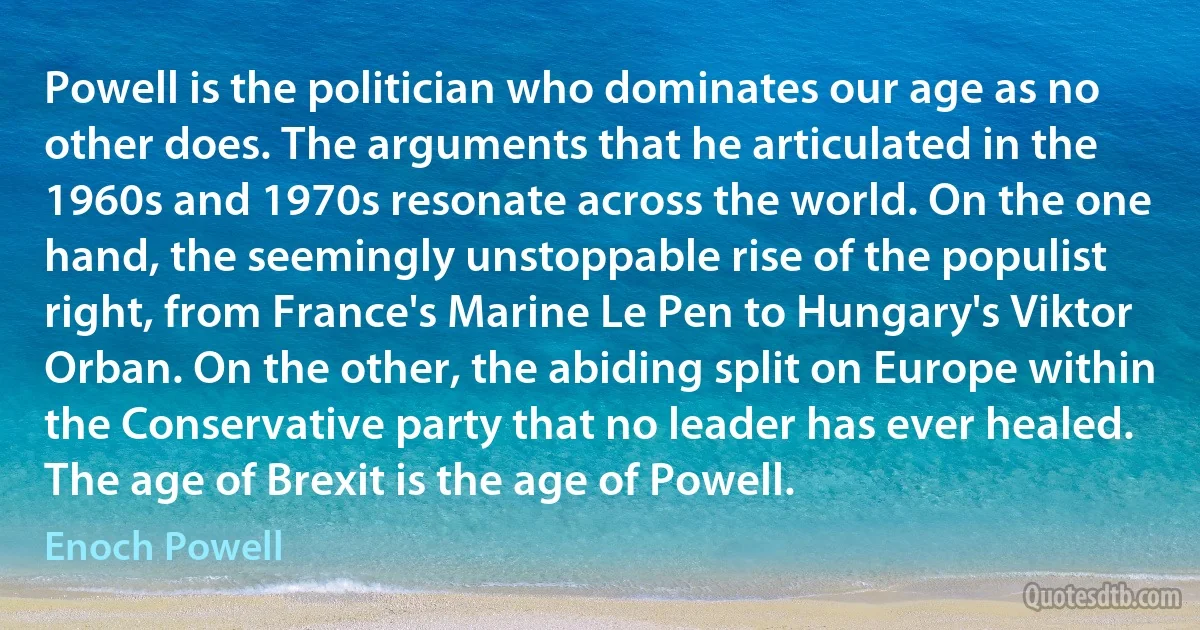Pen Quotes - page 20
I had entered the room knowing that Icke thought he was the son of God and that humanoid reptiles were the incarnation of evil, but not a lot more. I'd love to say I gained an insight, listening to him preach, without notes, laser pen in hand and an incomprehensible presentation beamed on to the wall behind him. I'm afraid I can't. He claims people mock him for leaving school at 15, when I – with my university degree – was left flummoxed because, try as I might, I couldn't understand what he was saying.

David Icke
...Lucretius talked epicureanism stoically (like Heine's Englishman taking his pleasures sadly), and concluded on his stren gospel of pleasure by committing suicide. His noble epic "on the Nature of Things", follows Epicurus in damning pleasure with faint praise. Almost contemporary with Caesar and Pompey, he lived in the midst of turmoil and alarms; his nervous pen is forever inditing prayers to tranquility and peace. One pictures him as a timid soul whose youth had been darkened with religious fears; for he never tires of telling his readers that there no hell, except here, and there are no gods except gentlemanly ones who live in a garden of Epicurus in the clouds, and never intrude in the affairs of men.

Will Durant
‘Arrey bhai, but why don't you write on Hindu fatwas?,'-that from a prominent intellectual who carries a haloed name. There is nothing like the fatwa among Hindus-but surely even our intellectuals know that. The point of such admonitions is different. In this view of the matter, a Hindu should stay clear of writing on Islam. Rather, that if he writes about matters Islamic or Muslim, he should only pen Hosannas-'the religion of tolerance, equality...'-he should only write books ‘understanding', that is explaining away the ‘Muslim mind'. At the least, if he just has to allude to some unfortunate drawback in it, he must attribute it to some special time and place and exculpate Islam from it! Even more important, he must make sure that he ‘balances' his remark about that point in Islam with denunciation about something in Hinduism, anything-the caste system, dowry deaths, looking upon foreigners as malechh, at least sati if nothing else fits the bill!

Arun Shourie
How can I live in this country
Where the foot knocks against
The unburied bones of kin?
I hear voices, see smiles. I cannot
Write anything; five hands
Seize my pen and order me to write
The story of their lives and deaths.
Was I born to become
a ritual mourner?
I want to sing of festivities,
The greenwood into which Shakespeare
Often took me. Leave
To poets a moment of happiness,
Otherwise your world will perish.

Czesław Miłosz
It is fair to say that the Russian secret state succeeded in getting worryingly close to serious political leaders in the United States, Britain, Germany, France and Italy. Time and again the Kremlin turned Western democracy into a game of matryoshka dolls. Lift out the Donald Trump or Nigel Farage or Jeremy Corbyn or Matteo Salvini or Marine Le Pen dolls, and you come face to face with Vladimir Putin – smirking at you.

John Sweeney (journalist)
In another January, on New Year′s Day in 1863, Abraham Lincoln signed the emancipation proclamation. When he put pen to paper, the president said, and I quote, "if my name ever goes down into history, it′ll be for this act, and my whole soul is in it.”"My whole soul is in it.” Today, on this January day, my whole soul is in this: bringing America together, uniting our people, uniting our nation. And I ask every American to join me in this cause.Uniting to fight the foes we face, anger, resentment and hatred, extremism, lawlessness, violence, disease, joblessness and hopelessness. With unity, we can do great things, important things.

Joe Biden
How can the Universe tell its own story save by making use of human speech; how convey its meanings to finite minds save by employing a thinker to declare them? So long as the story remains unspoken, unwritten, can we say it exists at all? Does not the significance of things become a story by the very process which ends in the movement of an intelligently guided pen over a sheet of paper, in the reading of printed types, in the utterance of recognised vocables; and until this process has been accomplished is not the "meaning” a mere promise or unrealized potency? Can we learn the history of the world, and of human life, otherwise than by reading, or hearing it spoken? How, then, can we receive it without the intermediation of a writer, a speaker?

L. P. Jacks
The cosy world we were told would go on for ever, where full employment would be guaranteed by a stroke of the Chancellor's pen, cutting taxes, deficit spending – that cosy world is gone. Yesterday, delegates pointed to the first sorry fruits: a high rate of unemployment. ... When we reject unemployment as an economic instrument - as we do - and when we reject also superficial remedies, as socialists must, then we must ask ourselves unflinchingly what is the cause of high unemployment. Quite simply and unequivocally, it is caused by paying ourselves more than the value of what we produce. There are no scapegoats. This is true in a mixed economy under a Labour Government as it is under capitalism or under communism. It is an absolute fact of life which no Government, be it left or right, can alter.

James Callaghan


